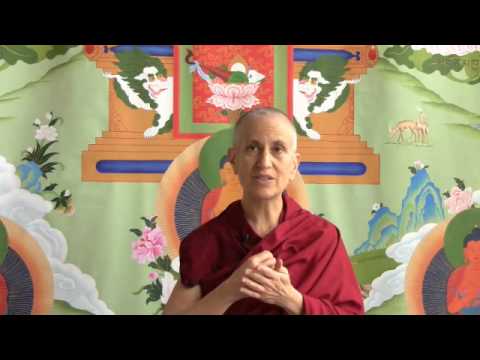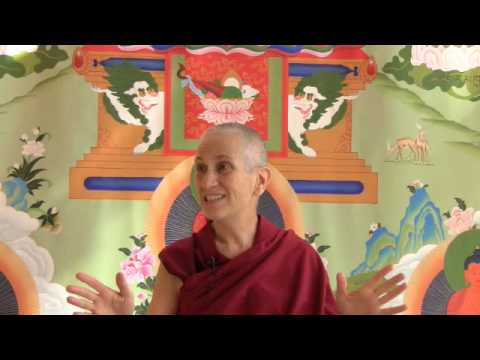The food offering
Part of a series of Bodhisattva's Breakfast Corner talks given during the Green Tara Winter Retreat from December 2009 to March 2010.
- Meditating on the causes and conditions and the kindness of others by which we have received food to eat
- With this practice, we can develop both the method and the wisdom sides of the path
Green Tara Retreat 059: Our food offering as a meditation on dependence (download)
In talking about things being dependent, when we were talking about the first level of understanding of dependence on causes and conditions, this brings up something in terms of the first lines we say in our contemplations before we eat. We contemplate “all the causes and conditions and the kindness of others by which I received this food.” You could spend an hour or two on that meditation. If you think of the causes and conditions by which we’ve received the food, in a physical way, there’s the seed and the ground and the sunshine and the water and all of that. That’s in terms of the substantial cause, the thing that actually turns into the result—all the different things that were the substantial causes of all the different things we’re eating. The cooperative conditions would refer, for example, to the people who help cultivate the crops, or who harvested them, or packaged them, or prepared them. Here, you’re getting into a meditation on dependence that is related to the kindness of sentient beings and also related to how things exist.
When we’re meditating on the kindness of sentient beings we reflect so much on how everything we have, we receive in dependence upon them. That acts as a cause for generating bodhicitta. Their dependence works on the method side of the path to help us arrive at bodhicitta. Then on the other, the wisdom side, we’re talking about how things are produced by causes and conditions and therefore they do not exist inherently. They do not have their own essence. They exist only because their causes exist. In a general sense, even though their causes go out of existence for them to exist. Just the fact that things are dependent on things that came before them, simply for them to exist. If things are dependent then they can’t be independent. They can’t have their own inherent essence. And so their dependence helps us understand the wisdom side of the path.
It’s quite interesting when you think of just this one line in offering our food and you have both method and wisdom within it.
Some of the people who are listening in may not realize that we changed the first line of the five contemplations because Venerable Jendy pointed out to us that the translation wasn’t so good. So the new translation is, “I contemplate all the causes and conditions and the kindness of others by which I received this food.”
[To the kitty] Yes. We mentioned food, and you heard, so please contemplate the causes and conditions and the kindness of others.
Venerable Thubten Chodron
Venerable Chodron emphasizes the practical application of Buddha’s teachings in our daily lives and is especially skilled at explaining them in ways easily understood and practiced by Westerners. She is well known for her warm, humorous, and lucid teachings. She was ordained as a Buddhist nun in 1977 by Kyabje Ling Rinpoche in Dharamsala, India, and in 1986 she received bhikshuni (full) ordination in Taiwan. Read her full bio.


